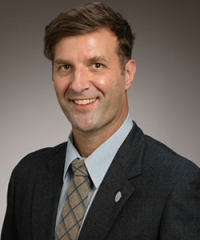Jon Hale (Education Policy, Organization and Leadership/Curriculum & Instruction) is a 2023–2024 HRI Faculty Fellow. Hale’s research, “I Pledge Allegiance: A History of Racist Ideas, Textbooks, and Teaching in the United States School System” provides critical historical analysis of recent efforts to control the curriculum in schools. This project builds upon the historiography around the “culture wars” and the deeply politicized nature of K12 curriculum by reexamining aspects of the history of United States public education.
Learn more about HRI’s Campus Fellowship Program, which supports a cohort of faculty and graduate students through a year of dedicated research and writing in a collaborative, interdisciplinary environment.
What is unique about your research on this topic?
My research examines a history of education in the United States that contextualizes recent efforts to control the curriculum in our schools, which have stoked ongoing tensions about what should be taught in our schools and who should teach it. Particularly regarding race, gender, and sexuality, rancorous debates over what should be taught and who should teach it have proffered a new curriculum of a far-right fundamentalist movement that has mobilized communities across the nation. Since 2019, at least thirty-six states have passed legislation that take aim at teaching “controversial” history while banning any semblance of Critical Race Theory (CRT). Some states have censored teaching around gender and sexual identity in early childhood and banned books that embraced queer and related justice-oriented issues. This research seeks to provide an analysis for a divided public about how we got to this point and where we can (hopefully) go from here.
What drives your interest in this research?
I am interested in contributing toward a collective effort to develop a shared critical analysis to unpack the violent ideologies at play in schools across the U.S. My interest stems from my research on freedom schooling as defined by historically disadvantaged communities to change unjust education policy. It also extends from my work on the history of school choice, which delineates how white policymakers and parents have used conceptions of “choice” to enact racist, exclusionary policy since the Brown v. Board of Education (1954) decision. This has led me to think deeply about the current crisis and to employ a critical lens to illuminate the history of the present struggle to offer quality public education in this season of book bans, overturning affirmative action, and criminalizing theories about race and sexuality in K12 schools.
I’m also indebted to the inspiring work of colleagues at Illinois who actively engage in critical work with or through the College of Education, including Dr. Asif Wilson, Dr. Rachel McMillian, Dr. Mirelsie Velázquez, Dr. Theo Moton, Dr. Yoon Pak, Dr. Aixa Marchand, Dr. Jennifer Johnson and many others. The intellectual environment at Illinois is always pushing me forward.
How has the fellowship seminar impacted the way you approach your research?
The fellowship seminar has deeply impacted how I approach my topic through an interdisciplinary lens that seeks to illuminate the totality of our experience. It has given me the space to take a step back to interrogate if and how this research is relevant to scholars outside the field of education. Sharing my work with thoughtful, rigorous, and talented scholars through the HRI Fellowship Seminar has been intimidating at times, but it has opened me up to fair critique that has pushed my analysis forward in productive ways. It has also been instrumental into learning from and with scholars outside of my academic discipline but who share a profound respect for the humanities.
